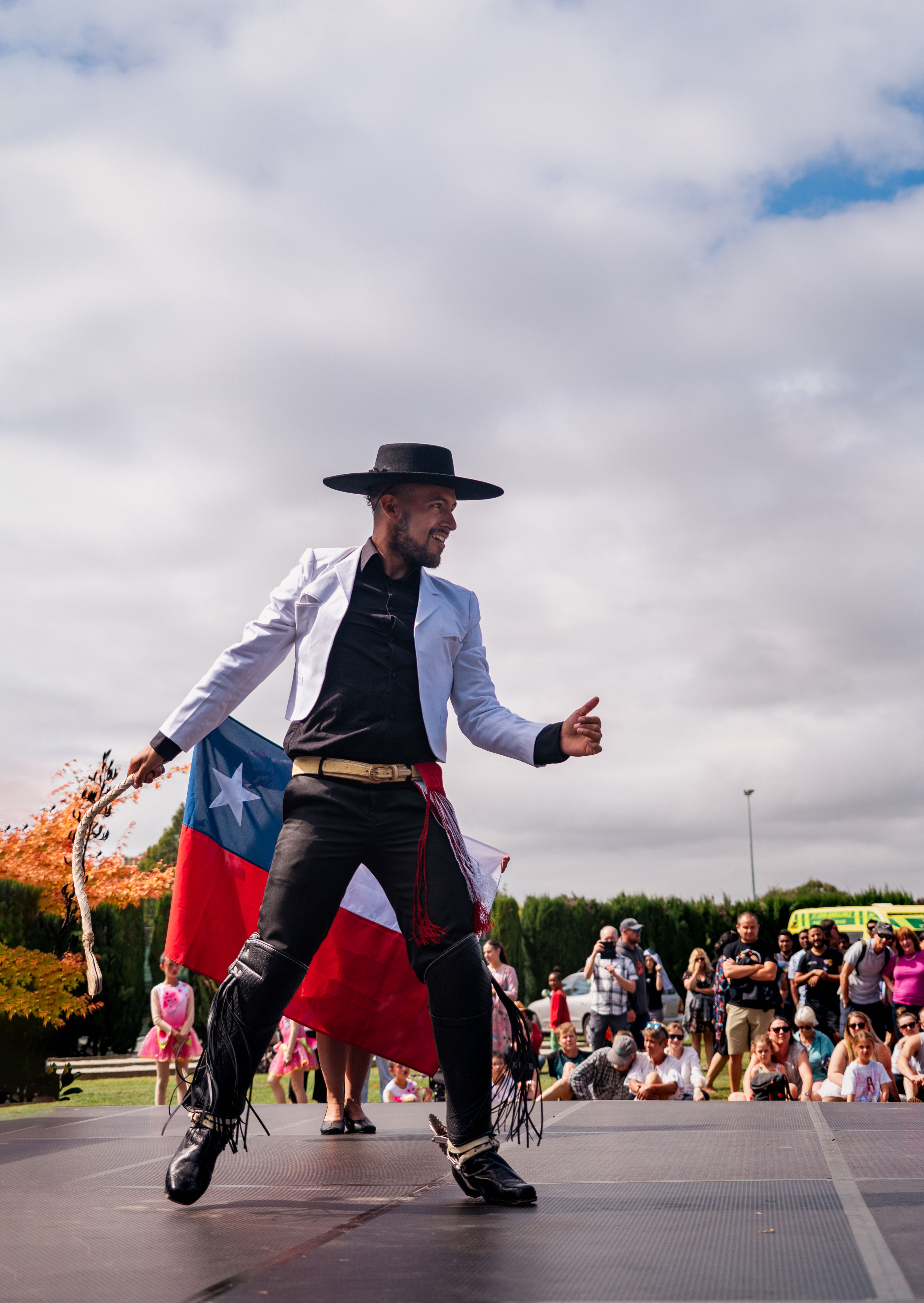A pinch of Chilean sabor

Marcelo Gonzalez performing at the Multicultural Festival. Photo: Francisco Ferca
Marcelo Gonzalez is embracing life in Marlborough with vigour since arriving from his home country of Chile. An acclaimed Latino dance teacher, performer and strong proponent for fitness, he is the cultural and sports event manager at the Marlborough Multicultural Centre. Marcelo talks to Adrienne Matthews about his life and the differences he has found between the two countries in a new feature about people who choose to make Marlborough home.
I arrived in Aotearoa in October 2019, a few months before the Covid-19 epidemic began. I am from the southern part of Chile, the Araucania Region, in a city called Loncoche, which is a Mapudungun name from the language of the Mapuches, who are our beautiful indigenous people.
I applied to come here through the university where I had worked for five years because I wanted to learn English. I chose Marlborough because it is a multicultural region where I knew I could contribute with my profession and talents.

The impressions I had of New Zealand before I came here was that it was a first world country with many tourist attractions, parks and green areas with plenty of trails to explore. I was very interested in the educational system because I am a teacher, and interested about the infrastructure of sports stadiums and how the clubs work.
My first thought when I arrived was, "Why are there so many orange cones here?" I had the opportunity to live as a backpacker for a few months, touring both the North and South Islands. I was amazed by the landscape, the beautiful people from around the world whom I met along the way, and the feeling of security when walking everywhere, which is very different from what happens in Latin America at the present time.
Most surprising for me was the multiculturalism here in Aotearoa. Through my job, I have met many migrants from a diverse range of backgrounds. More than 60 different nationalities are represented here, and more than 30 languages are spoken. Learning a piece of each of them enriches my soul.
The people of Marlborough have been very friendly and welcoming. I respect them a lot and I try to learn from them. Being a migrant means adapting to the culture and traditions of the region, respecting and contributing to the community, and, where possible, introducing the best traditions from home.
A big difference between our two cultures is the language. You speak Te Reo Māori, and although Mapudungun is still taught in some rural schools in the Araucanía Region, there is not the same respect for Mapuche culture, it is close to disappearing.
There is a big difference in food between the two countries, both in variety and quality. In Chile, meat, vegetables, and fruits are much tastier, and traditional Chilean dishes delight the palate. Here, I still haven’t found a traditional Kiwi dish. If one exists, please let me know.
Chilean culture is very friendly. We call it “skin”. What I mean is that when we greet a friend, we hug each other, we shake hands, we give them a kiss on the cheek. New Zealand culture is a little conservative in that sense. I'm not saying that's bad or wrong; it's just different.
Corruption in Chilean organizations, such as the police and members of political parties, is becoming normal. In New Zealand, that does not happen, and it makes a big difference in terms of security and governance of the country.
I really appreciate the patience of New Zealanders when I don't know the language and I try to explain something to them in ‘Spanglish,’ using my hands and making movements with my body to find some mutual understanding.
I also value the respect and gratitude from people when I have performed traditional Latin American dances at various national and international events in Aotearoa. Additionally, I appreciate the inclusion and integration I have felt from my football teammates at Rangers AFC, along with the management team and fans. They have treated me very well; I appreciate it so much.

Coming to Aotearoa has changed me. By migrating on my own, I have learned a lot about myself. I am a much more independent and mature person than I was before. By working with different cultures, I have absorbed the many positive aspects and try to incorporate them into my life. Furthermore, thanks to this experience I have been able to help other people who are often confused or just need a push to go out, leave their comfort zone and explore the world.
To anyone thinking of coming here, I would tell them this is a beautiful country, where you can find a diverse range of birds, landscapes, national parks, museums, art galleries, food from different countries and many cultural and sporting events. They absolutely must attend an All Blacks rugby game. I’d also tell them that small towns always have something magical. Explore them yourself and don't just travel to the popular places.
Come to New Zealand with a good level of English, review the available jobs and have a plan prepared so as not to be disappointed. If you don't understand the language well, you may feel a lot of frustration at the beginning of your trip. Also, if you travel alone without company, moments of loneliness can be quite challenging. Learn about the laws and rules of the country before travelling. It is important to always be kind to people and respect New Zealand culture and traditions. Be kind to the environment also. Explore as much as you can before settling.

I do miss family, friends and Chilean food but Marlborough is now my second home and I am very happy here. I hope to be able to successfully navigate the immigration processes and be able to stay but life has taught me that we must live in the present.
